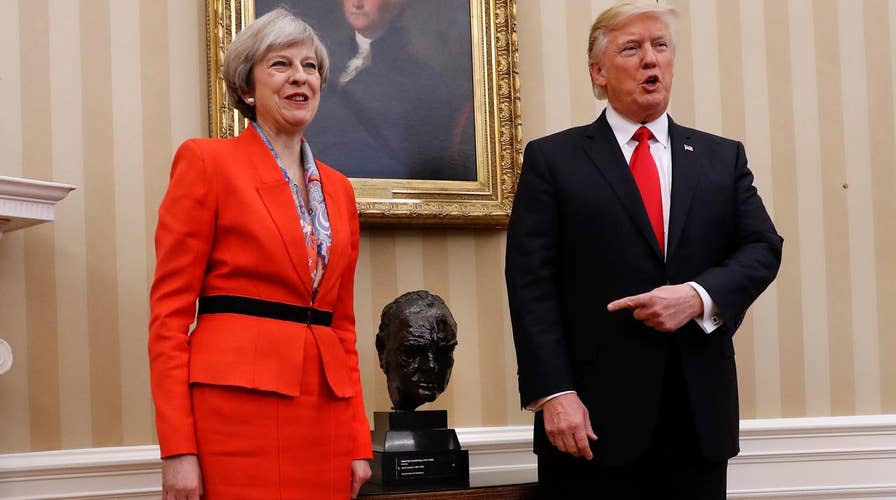Trump: It's a great honor to have Winston Churchill back
President Trump meets with PM Theresa May in the White House
President Trump, in his first meeting with British Prime Minister Theresa May Friday, pledged his “lasting support” to the historic relationship between the U.S. and the U.K., and called an independent Britain a “blessing to the world.”
During what was also Trump’s first meeting with a foreign leader, the pair posed in the Oval Office in front of a bust of Winston Churchill – a possible metaphor for how the Trump administration sees the relationship between the two countries as critical to its foreign policy.
Former Prime Minister Tony Blair gave President George W. Bush a bust in the wake of the 9/11 attacks. The bust was removed from the Oval Office by President Obama in 2009, triggering significant controversy.
“This is the original folks, in many, many ways,” he told the press. “It’s a great honor to have Winston Churchill back.”
“Well, thank you, Mr. President,” May replied. “We’re very pleased.”
At a subsequent news conference, Trump praised the special relationship between the two countries, and noted he had U.K. heritage on his mother’s side.
“The special relationship has been one of great forces in history for justice and for peace and, by the way, my mother was born in Scotland,” Trump said, and added he was looking forward to "working closely" with May.
May praised Trump's "stunning election victory" said she had conveyed an invitation from Queen Elizabeth II for Trump to visit the U.K. as part of a state visit – which he had accepted.
May said she believes they had struck up a good relationship, and said they discussed range of issues, including Syria, Russia and possible reforms to NATO.
“We are united in recognition of NATO as the bulwark of our collective defense,” May said, amid concerns in Europe that Trump had called NATO “obsolete” in a recent interview.
May added that it was important to make sure the alliance is equipped to fight terrorism and cyberwarfare. She also agreed to encourage European leaders to live up to their commitment to spend two percent of GDP on national defense. Trump has criticized some NATO allies for not contributing enough.
When asked by a reporter how the daughter of a vicar and a "brash TV extrovert" could get along, Trump quipped that he is “not as brash you might think,” and said he believes they will have a "fantastic relationship."
“We want to put the interests of ordinary, working people right up there on center stage,” May said.
Trump also praised the U.K. exit from the European Union, known as Brexit, saying it was as “a tremendous asset” and said Britain will carve out its own identity once it leaves the bloc. He also said a free and prosperous Britain would be a "blessing to the world."
While May and Trump are very different politicians in both style and in their brands of conservatism, the two share some common ground, and both find themselves somewhat isolated on the international stage.
While May did not vote to leave the European Union, her government is tasked with that responsibility as a result of a national referendum last summer. As a consequence, she has found herself isolated in Europe as European leaders play hardball and try to dissuade Britain from leaving the trading bloc.
Trump has found himself similarly isolated, faced with an international community that has at times shied away from, and even condemned some of his more controversial statements and beliefs. Some European leaders have sought to distance themselves from Trump, while on Thursday Mexican President Enrique Pena Nieto canceled a White House meeting over Trump’s plan to build a wall on the U.S.-Mexico border.
In the U.K, meanwhile, some left-wing politicians have balked at the new president and urged May to keep her distance – advice May has disregarded.
In Parliament Wednesday, left-wing Labour Party leader Jeremy Corbyn pushed May on the Women’s March, asking her if she supported the anti-Trump movement, and asking her to express concerns to him about his “misogyny.”
“Many have concerns… that in her forthcoming meeting with President Trump, she will be prepared to offer up for sacrifice the opportunity of American companies to come in and take over parts of our NHS [National Health Service] or our public services,” he added.
"I am not afraid to speak frankly to a president of the United States -- I am able to do that because of that special relationship -- a special relationship he would never have with the United States," she shot back, to cheers from the Tory backbenches.
Former Labour leader Ed Miliband meanwhile, urged May to tell Trump he must abide by the Paris Climate Change agreement, and snarkily added to offer the services of U.K. scientists to convince Trump “that climate change isn’t a hoax invented by the Chinese” to giggles from fellow lawmakers.
But prime ministers have often faced opposition from the British left when drawing close to American leaders. Famously, former Prime Minister Blair was repeatedly lambasted and mocked for his relationship with President Bush, with cartoonists, columnists and lawmakers deriding Blair as a “poodle” who was enabling Bush – who was frequently presented in European media as a reckless cowboy.





